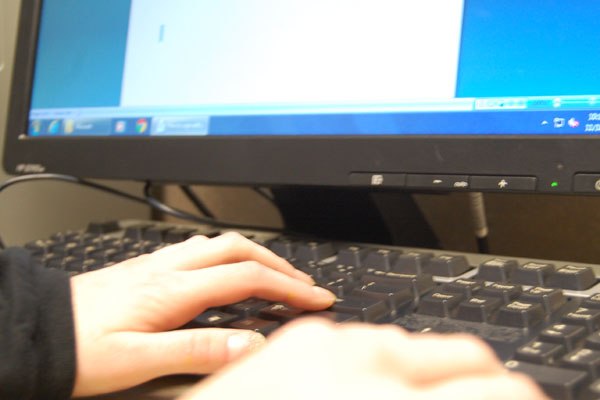For What It’s Worth: Online economics of Internet Safety

Photo Illustration by Kate Alaks
How are those words you typed influenced by economics? Read on to find out!
November 19, 2013
With the advent of recent Internet Safety Day the school celebrated Wednesday November 13, The Wild Economist thought it might be a good idea to take a look at the economics of that mysterious thing called the Internet, and what people do on it. I’ll be discussing social media, anonymity, and things of that nature. If this interests you… read on!
But I suppose I should add a disclaimer. I am possibly the most disconnected person in my grade, so I don’t have personal experience with most of the sites I might mention. I do know what they are, and I’ve read and observed enough regarding the subject to have a decent idea of what I’m talking about.
Now then. What prompts someone to go online, make an account on something, and perhaps to share all the gory details of their life with a thousand million strangers, give or take a few? I think it’s a mispercieved cost, at least partially, with very, very, obvious-with-neon-sign-flashing-at-you benefits.
First off, the benefits. When it seems like everyone around you has gotten an account on that site, or is chatting via snapchat or instagram, you can feel very isolated. If friends are cracking up about some in joke that happened well out of your range of technology, it can be sad. Unless you’re the type of person who wears their internet ineffectiveness on their sleeve like a badge, you’re suddenly feeling a ton of pressure to conform with the group. And you can make all sorts of valid arguments in favor of conforming.
“It will allow me to connect with so-and-so, who I see maybe once every two months.”
“I need to be involved in the facebook group for this club here.”
“I can meet other people involved in [club or sport or interest of choice], and make connections!”
“It looks like so much FUNNNNNNNN!”
So yes, there are lots of shiny benefits to joining social media. If you’re joining someplace where you’re going to be anonymous, or where no one will know it’s you, you might feel liberated from the need to behave like you normally do. You might feel more comfortable writing, talking, and sharing info when you know that the people you interact with on a daily basis probably won’t be seeing it. And, if they do, there’s no way to prove it was you.
BUT. There’s a problem. Because nothing is as it appears, and there are oodles of hidden costs to these sites. I’m not talking about all of a sudden getting a bill for a million dollars because you once took a picture and sent it to your friend, (although if that’s a possibility, you might want to skip that tool all together).
I’m actually talking about the hidden costs such as dependence on the technology in question (“I haven’t gotten a text from my friend in ten minutes!!!! I can’t stand it!!!), or the online bullying/stranger danger costs that Internet Safety Day focuses on.
The freedom of anonymity and no face-to-face contact means that sometimes people have an easier time being mean. They can’t see how you react, if you’re not brushing their words off your back. They may inadvertently say something that is offensive, inconsiderate, or just plain mean. Or they might be purposely malicious; using the silence of technology to terrorize someone for their own pleasure. In that case, since they probably won’t be overheard or ganged up on, they see the warped benefits as being stronger than the costs of their getting caught. This is nothing new, of course, but is intensified by the increased use of technology.
And then there’s the “creeper on the Internet” threat. While most of us are aware of the stories, I’m sure many people are thinking “I’m way too smart to fall for that. Seriously.” And that may be true, but you never know. It happens to someone, after all.
It also may not be just be a stupid photo that the wrong person sees online. Maybe it’s a post that never got deleted. What Internet Safety Day tries to do is increase the perceived cost of giving out information online, in the hopes that it will cause people to think twice and weigh the costs of their actions more accurately.
So does it work?
I think it probably does, in some cases. But there’s always the possibility of the message being repeated too often to have an impact. Surely you’ve experienced having that “WHAT?” moment when some type of news completely shocks you. After the twenty eighth time you’ve heard the same thing, it’s lost some of the shock value. It may have been ingrained in your mind, but it won’t surprise you as much. Thus, it won’t really change your percieved costs to hear it again. You’ll think “yup, I know all this. I do all this. At the same time, news that is too shocking might be percieved as implausible. The goal of such public service announcements has to be balance.
Did this year’s internet safety day acieve that?
Since everyone was split up and learning different things from different teachers, it’s hard to gauge. Add to that the fact that everyone has different prior knowledge and beliefs and it’s near about impossible. This might be something you should ask yourself, the next time you’re trying to calculate if you should set up yet another online account.


